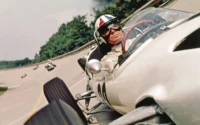Philip Hill was an American racing driver who competed in Formula One from 1958 to 1966, becoming the first and only U.S.-born driver to win the Formula One World Drivers’ Championship, which he claimed in 1961 with Ferrari. Hill was also a dominant figure in endurance racing, securing three victories in both the 24 Hours of Le Mans and the 12 Hours of Sebring, all with Ferrari. In 1964, driving for the North American Racing Team (NART), Hill added the 24 Hours of Daytona to his list of accomplishments, becoming the first driver to achieve the prestigious Triple Crown of endurance racing.
| Nationality | American |
|---|---|
| Born | Philip Toll Hill Jr. April 20, 1927 Miami, Florida, U.S. |
| Died | August 28, 2008 (aged 81) Monterey, California, U.S. |
Hill was one of only two American drivers to win the World Drivers’ Championship, alongside Mario Andretti. However, unlike Andretti, Hill was the only one born in the United States. Known for his calm and introspective nature, Hill often expressed a unique perspective on his racing career, once remarking, “I’m in the wrong business. I don’t want to beat anybody, I don’t want to be the big hero. I’m a peace-loving man, basically.” This thoughtful and gentle demeanor set him apart in the paddock and the wider motorsport community.
Phil Hill began racing at a young age, moving to England in 1949 as a Jaguar trainee. In 1956, he joined Enzo Ferrari’s team and made his Formula 1 debut in 1958 at the French Grand Prix driving a Maserati for Jo Bonnier and then in Round 9 of the season for the Ferrari F1 team. That same year, he became the first American-born driver to win the 24 Hours of Le Mans, partnering with Olivier Gendebien. Hill and Gendebien went on to win Le Mans again in 1961 and 1962.
Hill became a full-time driver for Ferrari in 1959, securing three podium finishes and placing fourth in the 1959 Drivers’ Championship. In 1960, he won the Italian Grand Prix at Monza, becoming the first American to win a Grand Prix in almost 40 years. In 1961, Hill claimed the World Championship after winning the 1961 Belgian Grand Prix, though the tragic death of teammate Wolfgang von Trips overshadowed his triumph. He left Ferrari after the 1962 season.
After Ferrari, Hill drove for various teams, including ATS and Cooper, before retiring from Formula 1 in 1966. He continued racing sports cars, notably winning his final race at Brands Hatch in 1967 with Chaparral. Hill also set speed records at Bonneville Salt Flats and appeared on the TV game showTo Tell the Truth in 1961. He retired from racing altogether in 1967.
Hill passed away on 28 August 2008, at the age of 81 in Salinas, California, after a long battle with Parkinson’s disease.
Phil Hill Formula One World Championship career
| F1 Career | 1958–1964, 1966 |
|---|---|
| Teams | Maserati (non-works), Ferrari, Cooper (non-works), Porsche, Automobili Turismo e Sport, Lotus (non-works), McLaren (non-works), Eagle |
| Entries | 52 (49 starts) |
| Championships | 1 (1961) |
| Wins | 3 |
| Podiums | 16 |
| Career points | 94 (98) |
| Pole positions | 6 |
| Fastest laps | 6 |
| First entry | 1958 French Grand Prix |
| First win | 1960 Italian Grand Prix |
| Last win | 1961 Italian Grand Prix |
| Last entry | 1966 Italian Grand Prix |
Phil Hill Teammates
| 17 Teammates | Involvement | First Year | Last Year |
|---|---|---|---|
| Jo Bonnier | 2 | 1958 | 1962 |
| Wolfgang von Trips | 18 | 1958 | 1961 |
| Mike Hawthorn | 3 | 1958 | |
| Olivier Gendebien | 7 | 1958 | 1961 |
| Jean Behra | 3 | 1959 | |
| Tony Brooks | 8 | 1959 | 1960 |
| Cliff Allison | 7 | 1959 | 1960 |
| Dan Gurney | 6 | 1959 | 1966 |
| Jose Froilan Gonzalez | 1 | 1960 | |
| Richie Ginther | 11 | 1960 | 1961 |
| Willy Mairesse | 7 | 1960 | 1962 |
| Henry Taylor | 1 | 1960 | |
| Ricardo Rodriguez | 8 | 1961 | 1962 |
| Pedro Rodriguez | 1 | 1961 | |
| Giancarlo Baghetti | 14 | 1962 | 1963 |
| Lorenzo Bandini | 4 | 1962 | |
| Bruce McLaren | 9 | 1964 |
Race Wins
| Win Number | Grand Prix |
|---|---|
| 1 | 1960 Italian Grand Prix |
| 2 | 1961 Belgian Grand Prix |
| 3 | 1961 Italian Grand Prix |
Complete Formula One results
| Year | Entrant | Chassis | Engine | 1 | 2 | 3 | 4 | 5 | 6 | 7 | 8 | 9 | 10 | 11 | WDC | Points1 |
|---|---|---|---|---|---|---|---|---|---|---|---|---|---|---|---|---|
| 1958 | Jo Bonnier | Maserati 250F | Maserati 250F1 2.5 L6 | ARG | MON | NED | 500 | BEL | FRA 7 | GBR | 10th | 9 | ||||
| Scuderia Ferrari | Ferrari Dino 156 F2 | Ferrari D156 1.5 V6 | GER 9 | |||||||||||||
| Scuderia Ferrari | Ferrari 246 F1 | Ferrari 143 2.4 V6 | POR DNA | ITA 3 | MOR 3 | |||||||||||
| 1959 | Scuderia Ferrari | Ferrari 246 F1 | Ferrari 155 2.4 V6 | MON 4 | 500 | NED 6 | FRA 2 | GBR | GER 3 | POR Ret | ITA 2 | USA Ret | 4th | 20 | ||
| 1960 | Scuderia Ferrari | Ferrari 246 F1 | Ferrari 155 2.4 V6 | ARG 8 | MON 3 | 500 | NED Ret | BEL 4 | FRA 12 | GBR 7 | POR Ret | ITA 1 | 5th | 16 | ||
| Yeoman Credit Racing Team | Cooper T51 | Climax FPF 2.5 L4 | USA 6 | |||||||||||||
| 1961 | Scuderia Ferrari SpA SEFAC | Ferrari 156 | Ferrari 178 1.5 V6 | MON 3 | NED 2 | BEL 1 | FRA 9 | GBR 2 | GER 3 | ITA 1 | USA DNA | 1st | 34 (38) | |||
| 1962 | Scuderia Ferrari SpA SEFAC | Ferrari 156 | Ferrari 178 1.5 V6 | NED 3 | MON 2 | BEL 3 | FRA DNA | GBR Ret | GER Ret | ITA 11 | 6th | 14 | ||||
| Porsche System Engineering | Porsche 804 | Porsche 753 1.5 F8 | USA DNS | RSA | ||||||||||||
| 1963 | Automobili Turismo e Sport | ATS 100 | ATS 100 1.5 V8 | MON | BEL Ret | NED Ret | ITA 11 | USA Ret | MEX Ret | RSA | NC | 0 | ||||
| Ecurie Filipinetti | Lotus 24 | BRM P56 1.5 V8 | FRA NC | GBR | GER | |||||||||||
| 1964 | Cooper Car Company | Cooper T73 | Climax FWMV 1.5 V8 | MON 9 | NED 8 | BEL Ret | FRA 7 | GBR 6 | GER Ret | USA Ret | MEX 9 | 19th | 1 | |||
| Cooper T66 | Climax FWMV 1.5 V8 | AUT Ret | ITA | |||||||||||||
| 1966 | Phil Hill | Lotus 25 | Climax FWMV 1.5 V8 | MON DNS | NC | 0 | ||||||||||
| Phil Hill | McLaren M3A | Ford 289 4.7 V8 | BEL Ret | FRA | GBR | NED | GER | |||||||||
| Anglo American Racers | Eagle T1F | Climax FPF 2.8 L4 | ITA DNQ | USA | MEX |
Sources:
- Phil Hill. Wikipedia.com


